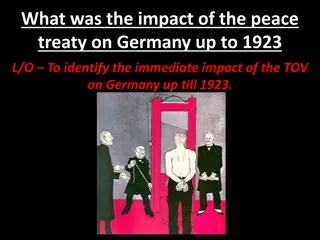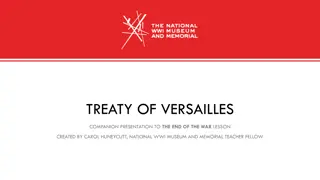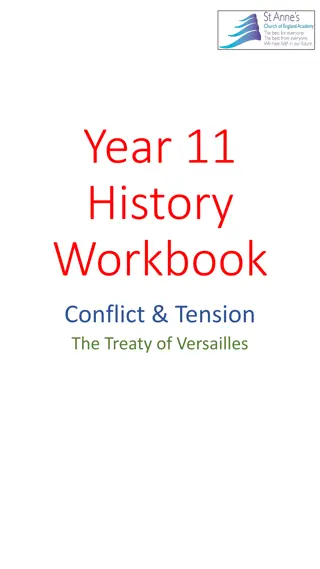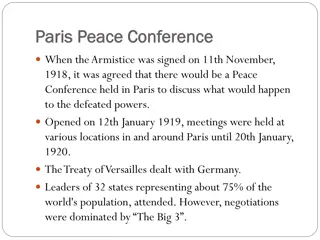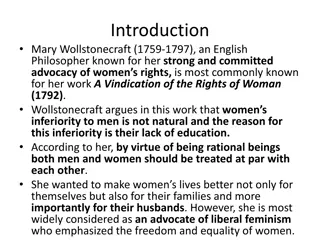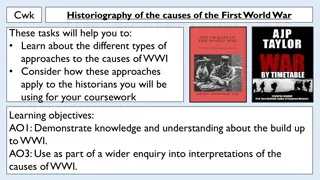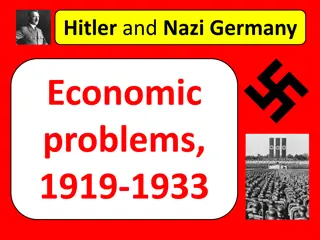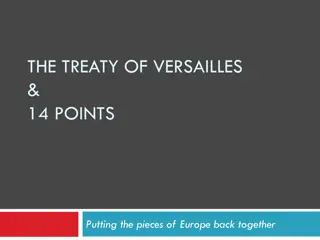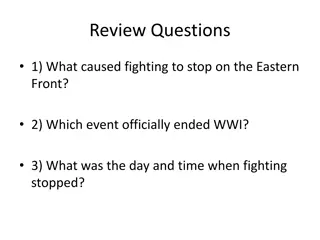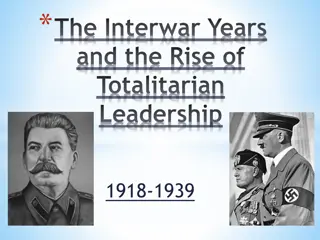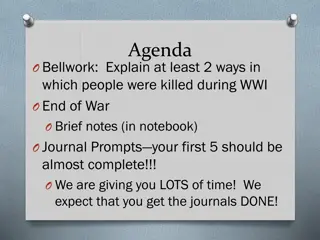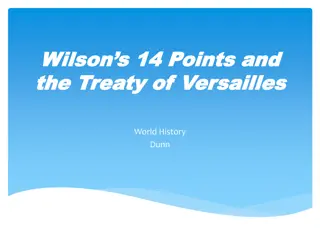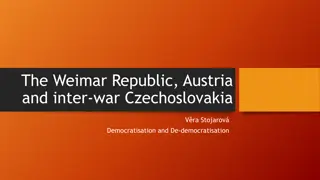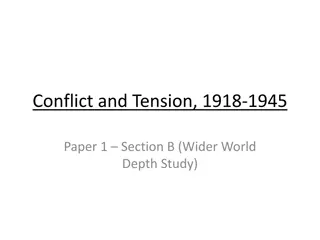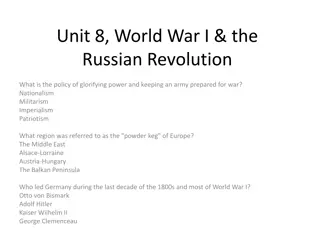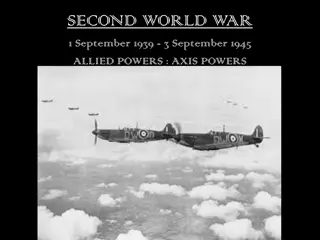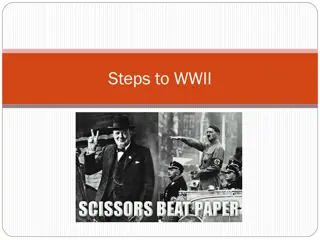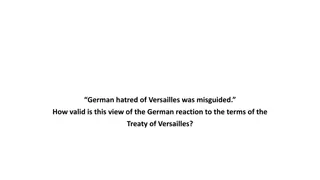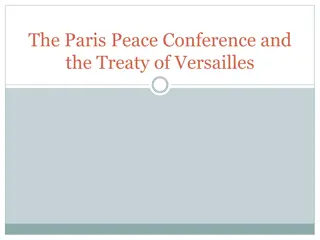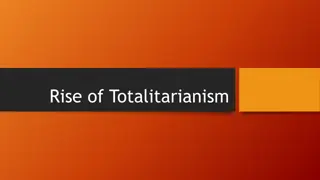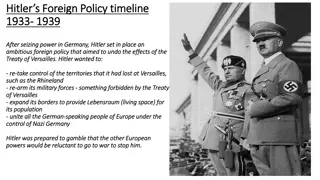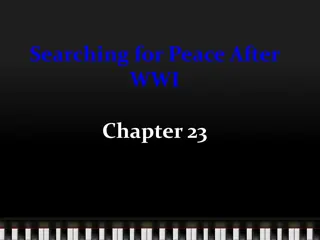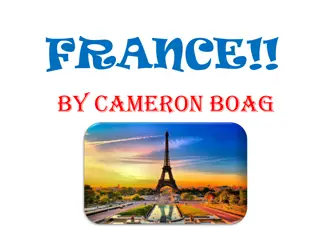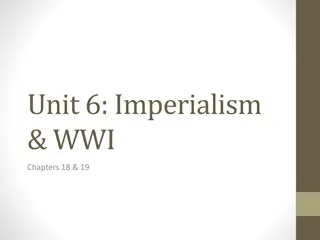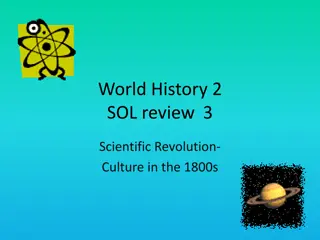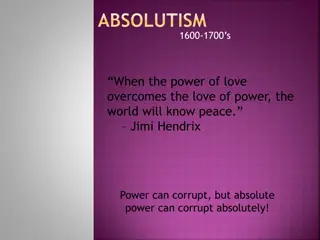Major Developments Following World War I: Impacts and Events
World War I, starting in 1914 with the assassination of Archduke Ferdinand, led to significant developments such as the Treaty of Versailles, worldwide depression, and the rise of Nazism. The war had profound effects on global geopolitics and economies, setting the stage for further conflicts and ch
1 views • 16 slides
Impact of Treaty of Versailles on Germany up to 1923
Germany faced immediate harsh consequences from the Treaty of Versailles, including huge reparations, loss of resource-rich lands, and political turmoil. The treaty led to economic bankruptcy, hyperinflation, and social unrest, with right-wing extremists attempting coups and assassinations. The occu
1 views • 8 slides
Treaty of Versailles Companion Presentation: Understanding the End of WWI
Explore the Treaty of Versailles and its significance through a companion presentation covering the Paris Peace Conference, major players like the Big 3, negotiation roles, and key terms. Learn about the attitudes of France, Great Britain, and the United States towards Germany post-WWI, the terms of
1 views • 14 slides
Understanding the Treaty of Versailles in Year 11 History Workbook
Exploring the aftermath of World War I, this Year 11 History workbook delves into the Treaty of Versailles, focusing on the aims of the Big Three leaders, the challenges they faced, and the terms imposed on Germany. Students engage in analyzing key points and disagreements, providing a comprehensive
1 views • 12 slides
Negotiations at the Paris Peace Conference: The Treaty of Versailles
The Paris Peace Conference of 1919 marked a significant event where the Treaty of Versailles was negotiated by the Big Three - Woodrow Wilson, Georges Clemenceau, and David Lloyd George. This treaty addressed key areas such as assigning guilt for the war, reducing armies, determining reparations, la
1 views • 19 slides
Women's Rights Advocacy in Historical Perspective
Mary Wollstonecraft, an English philosopher known for her advocacy of women's rights, particularly in her work "A Vindication of the Rights of Woman," challenged the notion of women's inferiority and lack of education. Her ideas laid the foundation for liberal feminism and influenced feminist moveme
0 views • 21 slides
Approaches to the Causes of World War I: Historiography Overview
Explore various historical perspectives on the origins of World War I, from the blame placed on Germany in the Treaty of Versailles to the revisionist and anti-revisionist interpretations that emerged post-World War II. Delve into differing views on nationalism, imperialism, militarism, and alliance
0 views • 13 slides
Economic Crises Faced by Weimar Republic, 1919-1933
The Weimar Republic encountered significant economic challenges between 1919 and 1933, leading to chaos and a surge in extremist support. Major crises included hyperinflation in 1923 and the devastating global Depression starting in 1929. The Treaty of Versailles imposed reparations on Germany, whic
0 views • 24 slides
The Impact of Treaty of Versailles and 14 Points on Europe Post-WWI
In the aftermath of World War I, the Treaty of Versailles and President Woodrow Wilson's 14 Points played pivotal roles in shaping Europe. The treaty aimed to restore peace by addressing the damages caused by the war, with key players like Wilson, George Clemenceau, David Lloyd George, and Vittorio
3 views • 19 slides
Woodrow Wilson's 14 Points and the End of WWI
Woodrow Wilson's 14 Points were a series of peace proposals aimed at ending World War I and establishing lasting peace. These points included measures such as ending secret treaties, ensuring freedom of the seas, and promoting self-determination. Wilson's efforts were recognized with the Nobel Peace
3 views • 10 slides
The Interwar Years: Rise of Totalitarian Leaders & Global Impact (1918-1939)
Explore the significant events of the Interwar Years, including Woodrow Wilson's 14 Point Plan, the Treaty of Versailles, the League of Nations, punishments imposed on Germany, US involvement post-WWI, and the impact of the Great Depression on global economy.
0 views • 21 slides
The End of World War I and the Treaty of Versailles
The end of World War I marked by the collapse of Germany's allies, the signing of the Treaty of Versailles, and the formation of the League of Nations. The aftermath of the war led to significant political and social challenges in Europe, with the U.S. proposing the Fourteen Points for peace. Howeve
0 views • 5 slides
Versailles Treaty and Wilson's 14 Points in World History
Wilson's 14 Points aimed to prevent future wars by advocating for an end to secret agreements, self-determination for ethnic groups, and the establishment of a League of Nations. However, at the Treaty of Versailles, conflicting interests among world leaders led to a different outcome, with Germany
0 views • 14 slides
Democratisation and De-democratisation: The Weimar Republic, Austria, and Inter-war Czechoslovakia
The period between the World Wars saw the birth of new states like the Weimar Republic, Austria, and Czechoslovakia, each facing unique challenges. From the aftermath of WWI to the Treaty of Versailles and economic crises, these states navigated political extremism, hyperinflation, and territorial c
0 views • 35 slides
World History: Conflict and Tension, 1918-1945 Analysis
Explore the topics of WWI aftermath, the Versailles Treaty, League of Nations, and WWII origins through source analysis and evaluation. Dive into the impact of WWI on countries, terms of the November Armistice, and compare the effects on Germany and the Allies. Develop a deep understanding of intern
0 views • 8 slides
World War I and the Treaty of Versailles: Key Events and Consequences
The policy of glorifying power and militarism, the tensions in the Balkan Peninsula, Germany's leadership, causes of the United States' entry into World War I, impact of unrestricted submarine warfare, transition to total war, the end of the war with an armistice, the Treaty of Versailles assigning
0 views • 10 slides
Major Events and Causes of World War II
This content covers the major events and causes of World War II, detailing the timeline from the invasion of Poland to key declarations of war and military strategies employed. The causes are explored, including factors like the Treaty of Versailles, economic instability, fascist expansions, and the
0 views • 17 slides
Events Leading to WWII: Treaty of Versailles to Japan's Invasion of Manchuria
Events like the Treaty of Versailles, Great Inflation in Germany, the October 1929 Depression, and Japan's invasion of Manchuria were significant precursors to World War II. The flawed Treaty of Versailles, economic turmoil in Germany, global depression, and territorial ambitions of Japan all contri
0 views • 25 slides
Mastering the DBQ: Understanding the Prompt and Documents
Learn how to excel in the Document Based Question (DBQ) on the APUSH Exam by focusing on analyzing the prompt, handling task, limiting, and content words, and assessing the validity of historical statements. Explore the role of opposition forces in the defeat of the Treaty of Versailles, President W
0 views • 23 slides
French Revolution Overview: March on Versailles, Constitution of 1791
Explore key events of the French Revolution including the Women's March on Versailles, the Constitution of 1791, the end of special privileges, and reforms in local government. Discover the impact on French society and the transition to a limited monarchy.
0 views • 13 slides
German Reaction to Treaty of Versailles: Misguided Hatred or Justified Resentment?
German resentment towards the Treaty of Versailles, seen by some as misguided, stemmed from divergent expectations, harsh territorial losses, and a perception of unfair treatment. While the treaty was not as severe as initially anticipated, it triggered a widespread sense of disillusionment and nati
0 views • 18 slides
Influential Forces and Outcome of the Paris Peace Conference & Treaty of Versailles
Representatives of major nations convened at the Paris Peace Conference in 1919 to discuss the post-World War I peace process. The Big Four, comprising Great Britain, France, the United States, and Italy, had significant influences in shaping the Treaty of Versailles. The demands of the Big Four var
0 views • 7 slides
Understanding Wilson's 14 Points and the Treaty of Versailles in History Class
Explore Wilson's Fourteen Points, analyze the Treaty of Versailles, and evaluate the Senate's perspective in this engaging history lesson. Dive into political cartoons, essential skills, and group activities to enhance understanding of key historical concepts.
0 views • 7 slides
The Rise of Totalitarianism: Impact of the Great Depression and Hitler's Ascension
Explore the causes of the Great Depression, the impact of the Treaty of Versailles on Italy and Germany, and analyze how Adolf Hitler came to power in Germany amidst the economic turmoil. Dive into the rise of Fascism in Europe, including Nazism, Mein Kampf, and Hitler's strategies for economic reco
0 views • 27 slides
Hitler's Ambitious Foreign Policy Timeline: 1933-1939
Hitler's foreign policy from 1933 to 1939 aimed at undoing the Treaty of Versailles by reclaiming lost territories, rearming military forces, expanding borders for Lebensraum, and uniting German-speaking people under Nazi Germany. The Saar region's reunification in 1935 boosted Hitler's plans, while
0 views • 12 slides
The Aftermath of WWI: Woodrow Wilson's 14 Points and the Treaty of Versailles
In the aftermath of World War I, Woodrow Wilson proposed his 14 Points as principles for peace, advocating for open diplomacy and self-determination for nations. However, the Treaty of Versailles imposed harsh penalties on Germany, leading to resentment and laying the groundwork for future conflicts
0 views • 10 slides
Discover Fun Facts, Geography, and Tourist Attractions in France
Explore interesting facts about France, including its population, capital, government, religion, and history. Learn about the geography of France, tourist attractions like the Eiffel Tower and Versailles, and enjoy a glimpse of French genuine food. Immerse yourself in the rich culture and history of
0 views • 7 slides
Global Conflicts and Revolutions: A Historical Perspective
The turbulent events of the 20th and 21st centuries, from the aftermath of WWI with the Treaty of Versailles to the devastating Rwandan Genocide in 1994, have shaped our world through wars, genocides, and ideological clashes. The rise of leaders like Hitler, the tragedy of Pearl Harbor, the Korean W
0 views • 7 slides
United States Foreign Policy Evolution from Imperialism to World War I
Explore the United States' foreign policy evolution from Imperialism to World War I, including the Open Door Policy, Dollar Diplomacy, and involvement in the Spanish-American War. Learn about the military actions in acquiring territories such as Puerto Rico, Guam, Philippines, and Hawaii. Delve into
0 views • 8 slides
The Enlightenment and Absolutism: Key Concepts and Figures
The period saw significant developments, including the Scientific Revolution emphasizing reason and systematic observation, leading to the expansion of scientific knowledge. Absolutism showcased monarchs' control, like Peter the Great's westernization of Russia and Louis XIV's Palace of Versailles.
0 views • 22 slides
Rise and Fall of Absolutism: A Glimpse into 17th-Century Monarchy
Explore the era of Absolutism (1600-1700s) where rulers wielded absolute power, influenced by divine right beliefs. Focusing on Louis XIV of France, known as the Sun King, who shaped France's destiny through extravagant projects like the Palace of Versailles. However, challenges to absolute rule eme
0 views • 17 slides

